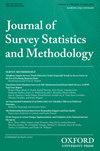Reducing Burden in a Web Survey through Dependent Interviewing
IF 1.6
4区 数学
Q2 SOCIAL SCIENCES, MATHEMATICAL METHODS
引用次数: 0
Abstract
Longitudinal surveys provide valuable data for tracking change in a cohort of individuals over time. Respondents are often asked to provide similar, if not the same, data at multiple time points. One could argue that this unnecessarily increases respondent burden, especially for information that does not change frequently. One way to reduce burden while still capturing up-to-date information may be to implement dependent interviewing (DI), where the respondent is provided information from the last data collection to aid in answering the current survey. If the information is still correct, then no change is needed, but if incorrect, the respondent has the option to change the response. To test this, we implemented two different versions of DI in a self-administered web survey and compared these against a traditional version of the web survey. We examined respondent burden by analyzing timing data and respondent enjoyment by analyzing debriefing questions. To assess the success of the implementation, we looked at timing data and undesirable behavior (missing data and backtracking). Finally, to evaluate measurement error, we looked at the number of meaningful changes. We found that DI is faster, more enjoyable, easily executed by the respondent (more so in one of our experimental formats), and significant measurement error was not introduced. In addition, DI provided consistency in the data, minimizing the noise introduced by nonmeaningful changes. The findings have significant implications for implementing DI in self-administered modes without an interviewer present.通过依赖访谈减轻网络调查的负担
纵向调查为跟踪一组个体随时间的变化提供了有价值的数据。受访者经常被要求在多个时间点提供相似(如果不相同的话)的数据。有人可能会说,这不必要地增加了受访者的负担,尤其是对于不经常变化的信息。在获取最新信息的同时减轻负担的一种方法可能是实施依赖性访谈(DI),向受访者提供上次数据收集的信息,以帮助回答当前调查。如果信息仍然正确,则无需更改,但如果信息不正确,受访者可以选择更改回复。为了测试这一点,我们在一个自我管理的网络调查中实现了两个不同版本的DI,并将其与传统版本的网络调查进行了比较。我们通过分析时间数据来考察受访者的负担,并通过分析汇报问题来考察受访者享受。为了评估实现的成功,我们查看了定时数据和不良行为(丢失数据和回溯)。最后,为了评估测量误差,我们观察了有意义的变化的数量。我们发现DI更快、更愉快、更容易被受访者执行(在我们的一种实验格式中更是如此),并且没有引入显著的测量误差。此外,DI提供了数据的一致性,最大限度地减少了非意义变化带来的噪声。研究结果对在没有面试官在场的情况下以自我管理模式实施DI具有重要意义。
本文章由计算机程序翻译,如有差异,请以英文原文为准。
求助全文
约1分钟内获得全文
求助全文
来源期刊
CiteScore
4.30
自引率
9.50%
发文量
40
期刊介绍:
The Journal of Survey Statistics and Methodology, sponsored by AAPOR and the American Statistical Association, began publishing in 2013. Its objective is to publish cutting edge scholarly articles on statistical and methodological issues for sample surveys, censuses, administrative record systems, and other related data. It aims to be the flagship journal for research on survey statistics and methodology. Topics of interest include survey sample design, statistical inference, nonresponse, measurement error, the effects of modes of data collection, paradata and responsive survey design, combining data from multiple sources, record linkage, disclosure limitation, and other issues in survey statistics and methodology. The journal publishes both theoretical and applied papers, provided the theory is motivated by an important applied problem and the applied papers report on research that contributes generalizable knowledge to the field. Review papers are also welcomed. Papers on a broad range of surveys are encouraged, including (but not limited to) surveys concerning business, economics, marketing research, social science, environment, epidemiology, biostatistics and official statistics. The journal has three sections. The Survey Statistics section presents papers on innovative sampling procedures, imputation, weighting, measures of uncertainty, small area inference, new methods of analysis, and other statistical issues related to surveys. The Survey Methodology section presents papers that focus on methodological research, including methodological experiments, methods of data collection and use of paradata. The Applications section contains papers involving innovative applications of methods and providing practical contributions and guidance, and/or significant new findings.

 求助内容:
求助内容: 应助结果提醒方式:
应助结果提醒方式:


